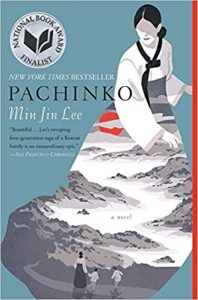HISTORY LESSONS FROM PACHINKO

Min Jin Lee’s novel Pachinko opens with this sentence: “History has failed us, but no matter.” While Lee’s emphasis in the novel is aimed squarely on the “us” in that sentence, I was captivated by the history she explores, largely because my knowledge of it was sorely lacking.
Pachinko begins in Yeongdo, Korea, in 1910, the year the country was annexed by the Empire of Japan after years of war and intimidation. During the occupation that followed, Japan took over Korea’s labor and land and waged war on its culture. Japanese families were given land in Korea, where they chopped down trees by the millions and planted non-native species. Korean workers were forced to work in Japan and its other colonies.
Meanwhile, after seizing treasures of Korean art history and culture, the Japanese government used them to promote itself as a civilizing and modern force. Consequently, textbooks, museums, and other icons of learning spread the idea of Korea as backwards and primitive compared with Japan, a view of the Korean people that became rooted among Japanese and even among some Koreans.
In 1939, Koreans were pressured by Japanese authorities to change their names to Japanese names. Since people without Japanese names were not recognized by the colonial bureaucracy, more than 80 percent of all Koreans complied with the order.
The plight of the Korean people, particularly the common people, during the occupation, as well as World War II, the Cold War, and the Korean War, inspired Lee to write Pachinko. The novel follows four generations of the same family through the hardships, heartaches, discrimination, and occasional joys of living in Korea and Japan from 1910 until 1989. In an interview included with the paperback edition, Lee says that history often fails to represent everyone because poor and middle-class men and almost all women usually leave no written evidence of their lives. To research Pachinko, she interviewed many Korean-Japanese to gather their oral histories.
As I read about Lee’s fictional characters, all of whom are interesting and endearing, I had more questions about the historical events that shaped their lives. I knew about the dividing of Korea between the Soviet Union and the United States after World War II, but I wondered why Japan wasn’t divided as well. Perusing several websites taught me that the Soviet Union didn’t declare war on Japan until the final weeks of the conflict, whereas the United States had done most of the fighting there. Also, U.S. President Harry Truman thought that Japan would be easier to administer if the United States was the only occupying power.
The Soviets did receive some parts of the Japanese Empire, however. They were given the Kuril Islands and Sakhalin Island, which Japan had taken from the Russians in 1905.
Toward the end of Pachinko, one of the characters questions why German-Americans weren’t placed in internment camps in the United States during World War II as the Japanese-Americans were. Since her companion doesn’t give her an answer, I was back to the internet to find out. I learned that German-Americans were interned on an individual basis rather than as a group. Although the War Department considered removing ethnic Germans and ethnic Italians from the east and west coasts, it didn’t follow through, mainly because of the numbers of people involved. According to Wikipedia, a total of 11,507 people of German ancestry were interned during the war, compared with 110,000 to 120,000 Japanese-Americans held in internment camps.
I would say that Lee reached and exceeded her goal of creating Pachinko to bring attention to the ways common people lived through this time of catastrophe, including wars, displacements, changing ideas, and other historic events. Her intimate revelations of her characters’ lives bring a reality to those events that the usual broad descriptions can’t. And she sparked a curiosity in me, for which I am grateful.
Sally Whitney
Sally Whitney is the author of When Enemies Offend Thee and Surface and Shadow, available now from Pen-L Publishing, Amazon.com, and Barnesandnoble.com. When Enemies Offend Thee follows a sexual-assault victim who vows to get even on her own when her lack of evidence prevents police from charging the man who attacked her. Surface and Shadow is the story of a woman who risks her marriage and her husband’s career to find out what really happened in a wealthy man’s suspicious death.
Sally’s short stories have appeared in magazines and anthologies, including Best Short Stories from The Saturday Evening Post Great American Fiction Contest 2017, Main Street Rag, Kansas City Voices, Uncertain Promise, Voices from the Porch, New Lines from the Old Line State: An Anthology of Maryland Writers and Grow Old Along With Me—The Best Is Yet to Be, among others. The audio version of Grow Old Along With Me was a Grammy Award finalist in the Spoken Word or Nonmusical Album category. Sally’s stories have also been recognized as a finalist in The Ledge Fiction Competition and semi-finalists in the Syndicated Fiction Project and the Salem College National Literary Awards competition.
- Web |
- More Posts(67)